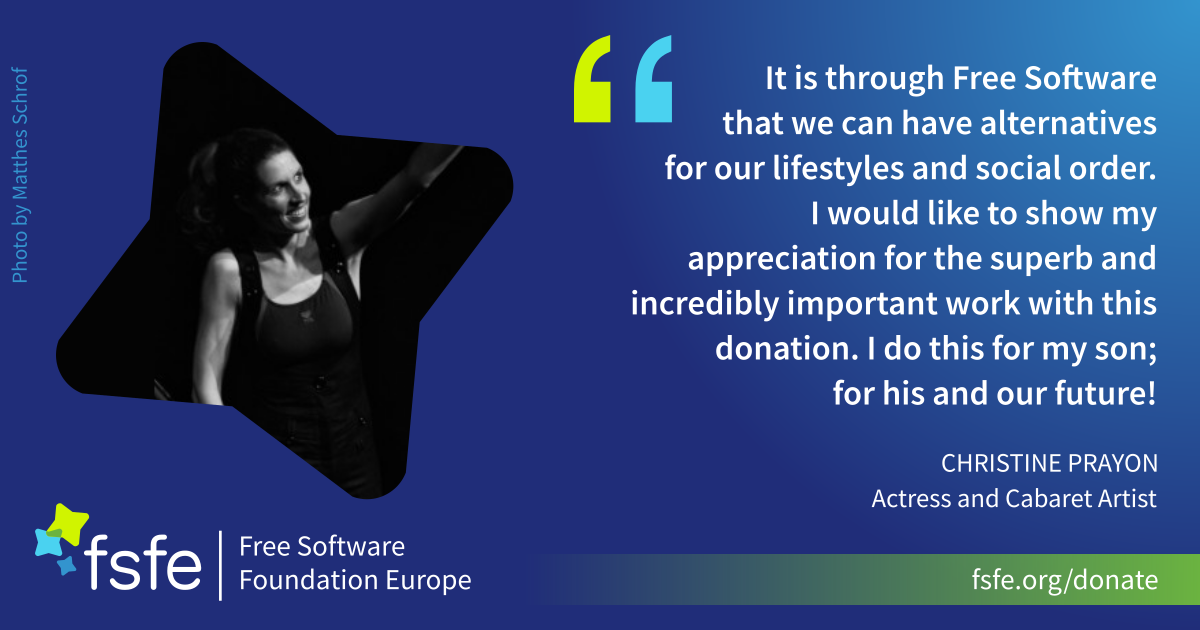FSFE Newsletter - June 2019
jeudi 27 juin 2019 à 01:00This month's newsletter highlights the Google/Huawei case and the greater picture it reveals to us. In the Get Active section we call for your proactivity in promoting the use of Free Software. Additionally, you can find out what happened at our Web-a-thon in Frankfurt am Main and view some media of the actions we have taken for promoting and increasing the awareness of Free Software to the wider audience, as well as see what's planned for the near future, where you can take part in.
The Google - Huawei LessonsLast month, Google blacklisted and blocked Huawei from accessing all its proprietary components of the Android mobile operating system. The California based tech giant had to comply with the executive order issued by the U.S. government to effectively ban all American companies from trading with Huawei. While the Chinese telco will not have access to Google's proprietary components, it will nevertheless be able to use those parts of Android's operating system available under the open source licence, which is free for anyone to use. This highlights the importance that Free Software has for users, public bodies, and businesses. The Free Software Foundation Europe presented three essential lessons from this case:
Free Software enables control over technology: The more important technology becomes in our daily lives, the more relevant Free Software becomes for individual users. The EU is overly reliant on foreign sources of technology: The European Union and its member states should invest in Free Software development and focus on supporting local Free Software organisations and businesses. This can foster greater technological independence for the EU economy. Free Software gives companies technological independence.: A company that uses proprietary software is dependent on such software's vendor and the government that regulates it. The best strategy for a company to avoid this is to use as much Free Software as possible in their supply chains.Read more details about these lessons in our press release.
Join our community: https://fsfe.org/join/nl2019-06
Do not miss: upcoming events with the FSFEAs with every month, we are trying to spread the word and help individuals and organisations understand what Free Software is and how Free Software contributes to freedom, transparency, and self-determination. If you are interested in seeing us in action and join our cause, keep in mind the following dates and locations in the coming few months:
On July 3rd, FSFE Programme Manager Max Mehl will explain how Free Software can be the solution to many security problems at Pass the Salt in Lille, France. On July 6th, FSFE supporter Reinhard Müller will give a presentation at Tübix about the development of web applications he used successfully for the development of the new online FSFE community portal in Tübingen, Germany On July 8th, the FSFE community in Bonn will have a meeting discussing Free Software. On July 22nd, the Franken community of the FSFE and the Nuremberg Hackerspace will be hosting a lecture about the basics and common misunderstandings of Free Software in Nuremberg, Germany Between August 21st and 25th the FSFE will host an assembly at the Chaos Communication Camp in Mildenberg, Germany. The assembly will be part of about:freedom, a cluster with a focus on digital (human) rights politics, freedom of information and Free Software advocacy. It is a union of different and diverse organisations from all over the world promoting Free Software and defending and extending digital rights. There will be workshops on-site and information materials. If you are coming to the camp, drop by and have a chat with us! What have we done? Inside and Outside the FSFESince the last newsletter we have been very active in promoting the Free Software cause, by helping individuals and organisations have a better understanding of what Free Software is and encouraging them to develop and implement it in their lives. We want to share with you the events we have photos and videos for, below:
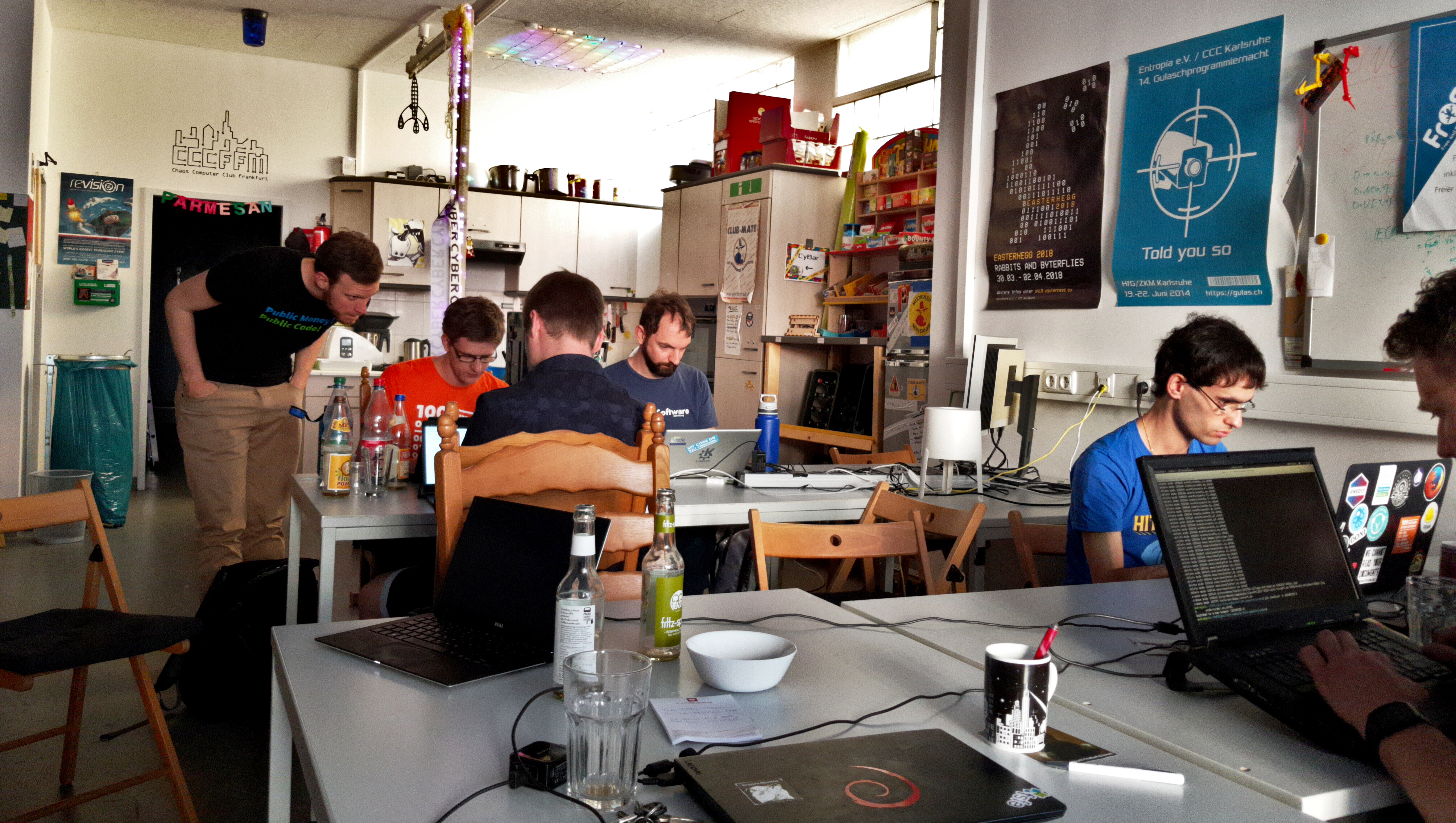 Our web-a-thon in Frankfurt.
Between May 24th and 26th, the FSFE ran our web-a-thon 2019. There were 13 hackers (and more in the evenings) who met in Frankfurt (Main) to work on the FSFE's website, and of course to also celebrate our nice community and commemorate International Towel Day. We aimed high and tried to get rid of many unresolved issues, some rather small, some highly important for editors, translators and of course our visitors. In the milestone "Hackathon1905", we collected the issues to be worked on, and it turns out that we achieved more than we anticipated. 47 tickets and pull requests have been closed successfully. Thanks to everyone who participated, maintained the good mood throughout and to the CCC FFM for hosting us patiently during the whole weekend!
Our web-a-thon in Frankfurt.
Between May 24th and 26th, the FSFE ran our web-a-thon 2019. There were 13 hackers (and more in the evenings) who met in Frankfurt (Main) to work on the FSFE's website, and of course to also celebrate our nice community and commemorate International Towel Day. We aimed high and tried to get rid of many unresolved issues, some rather small, some highly important for editors, translators and of course our visitors. In the milestone "Hackathon1905", we collected the issues to be worked on, and it turns out that we achieved more than we anticipated. 47 tickets and pull requests have been closed successfully. Thanks to everyone who participated, maintained the good mood throughout and to the CCC FFM for hosting us patiently during the whole weekend!
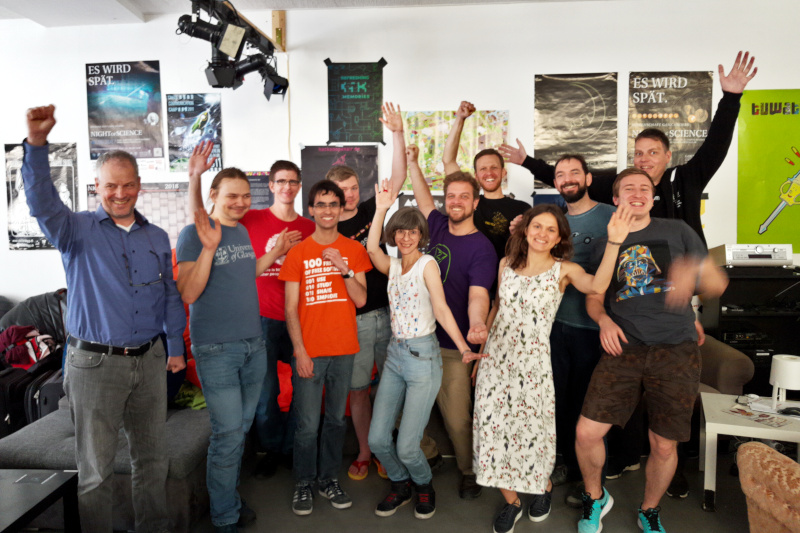 Some of the people behind fixing the FSFE's website during the 2nd web-a-thon for the year
Lucas Lasota, the FSFE's legal intern, presented the legal trends in Free Software at the Libre Graphics Meetings in Saarbrücken, Germany on May 29th. You can watch his presentation video.
Some of the people behind fixing the FSFE's website during the 2nd web-a-thon for the year
Lucas Lasota, the FSFE's legal intern, presented the legal trends in Free Software at the Libre Graphics Meetings in Saarbrücken, Germany on May 29th. You can watch his presentation video.
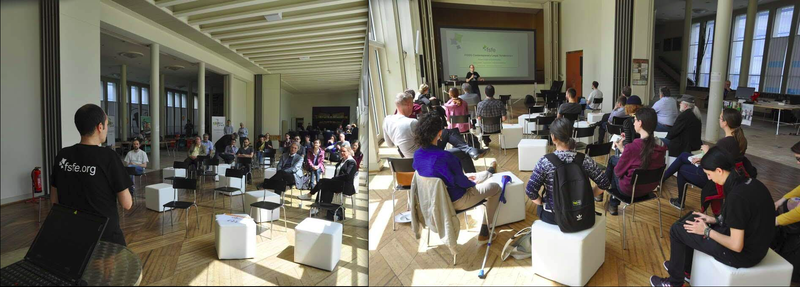 Lucas Lasota at the Libre Graphics Meetings in Saarbrücken
Lucas Lasota at the Libre Graphics Meetings in Saarbrücken
The Viennese FSFE supporters group participated with an FSFE info-booth at the local street festival Veganmania between June 7th and 10th in Vienna, Austria. See pictures of the event and read about the local group's successful down-to-earth approach in a report by Franz Gratzer.
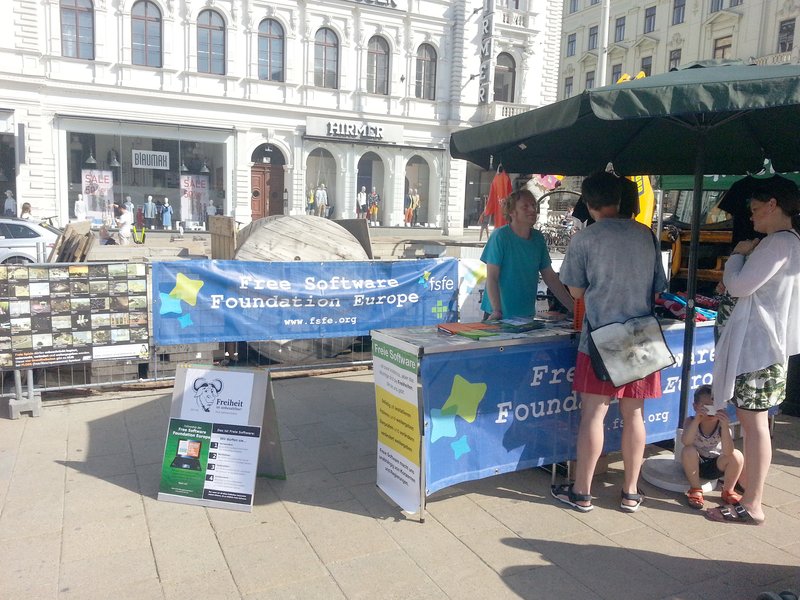 The FSFE booth at Veganmania in Vienna
The FSFE booth at Veganmania in Vienna
The FSFE's president Matthias Kirschner gave a keynote about Free Software in our society at this year's OW2 on June 13th in Paris. You can watch the keynote video.
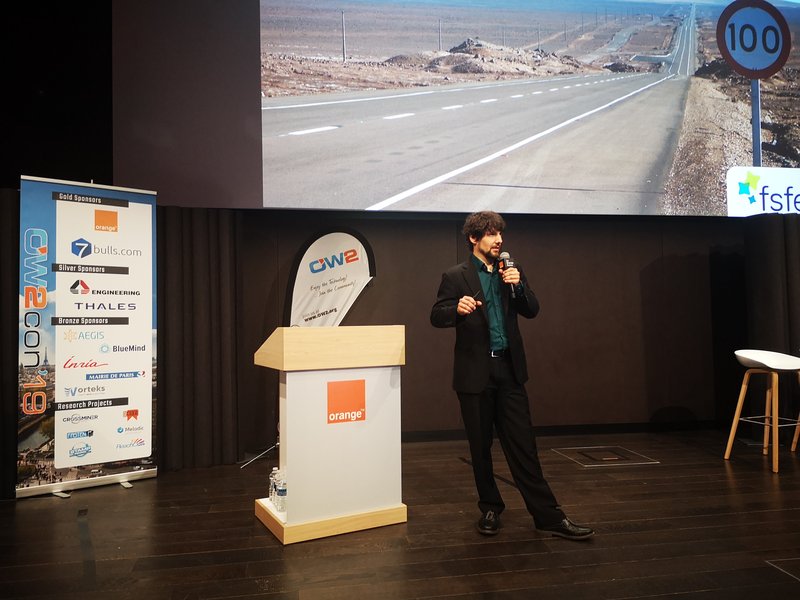 Matthias Kirschner keynote at OW2 in Paris
Matthias Kirschner keynote at OW2 in Paris
Our Policy Manager Alexander Sander was invited as an expert on E-Government in the Landtag Saarland, the parliament of the German federal State Saarland on June 17th. In his talk he discussed the advantages of free software in the area of e-government. You can find his expert opinion and research here:
The FSFE participated with a booth at the OpenExpo in Madrid, Spain on June 20th where we had the chance to meet and talk to many people about Free Software.
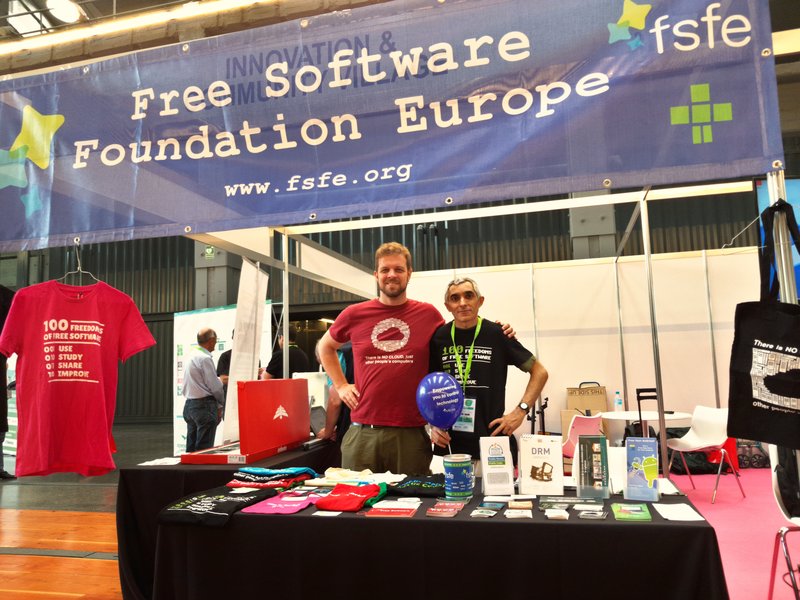 Erik Albers and Pablo González Otero at the OpenExpo in Madrid
On June 25th, the FSFE's Policy and Project Managers Alexander Sander and Galia Mancheva talked about the Public Money? Public Code! campaign and the updated Copyright Directive at Libertybits in Sofia, Bulgaria
Erik Albers and Pablo González Otero at the OpenExpo in Madrid
On June 25th, the FSFE's Policy and Project Managers Alexander Sander and Galia Mancheva talked about the Public Money? Public Code! campaign and the updated Copyright Directive at Libertybits in Sofia, Bulgaria
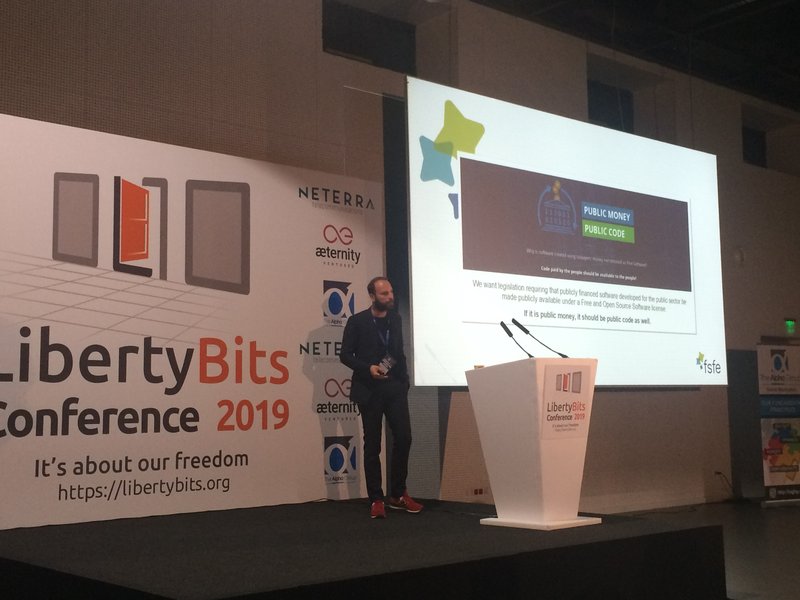 Alexander Sander talks about PMPC at the Libertybits event in Sofia, Bulgaria
Alexander Sander talks about PMPC at the Libertybits event in Sofia, Bulgaria
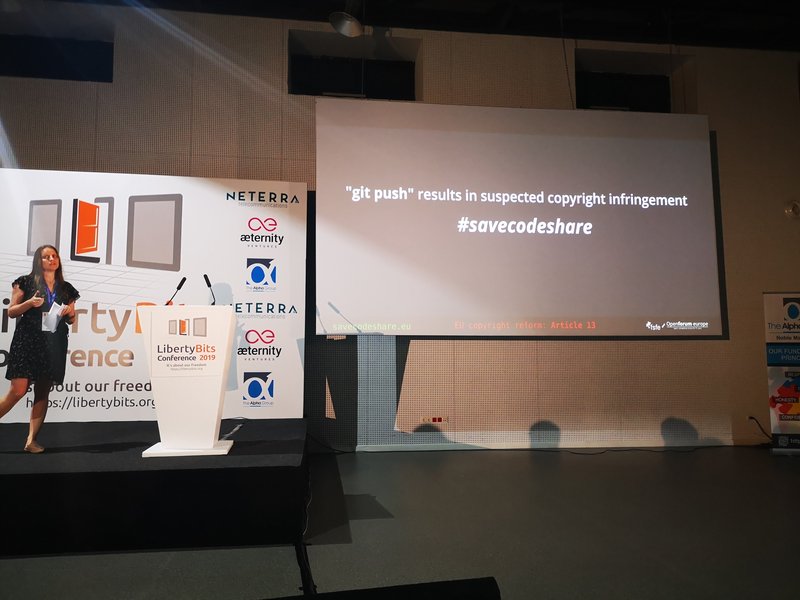 Galia Mancheva presents the Copyright Directive updates at the Libertybits in Sofia, Bulgaria
Get Active
Galia Mancheva presents the Copyright Directive updates at the Libertybits in Sofia, Bulgaria
Get ActiveDo you remember that some years ago the German newspaper Die Tageszeitung (TAZ) received the Document Freedom Day Award for delivering its electronic paper to its subscribers in a choice of open formats, and without digital restrictions (DRM)? This year, the TAZ newspaper went a step further and even launched their taz.app on f-droid under a Free Software license. This is a great example for other newspapers to follow. Contact your favourite newspaper and demand they follow the TAZ's example of giving users freedom of choice and technical control.
Contribute to our newsletterIf you would like to share any thoughts, pictures, or news, send them to us. As always, the address is newsletter@fsfe.org. We're looking forward to hearing from you!
If you also want to support us and our work, join our community and support us with a donation or a monthly contribution: https://my.fsfe.org/support
Thanks to our community, all the volunteers, supporters and donors who make our work possible. And thanks to our translators, who enable you to read this newsletter in your mother tongue.
Your editors,
The FSFE team
Join our community: https://fsfe.org/join/nl2019-06
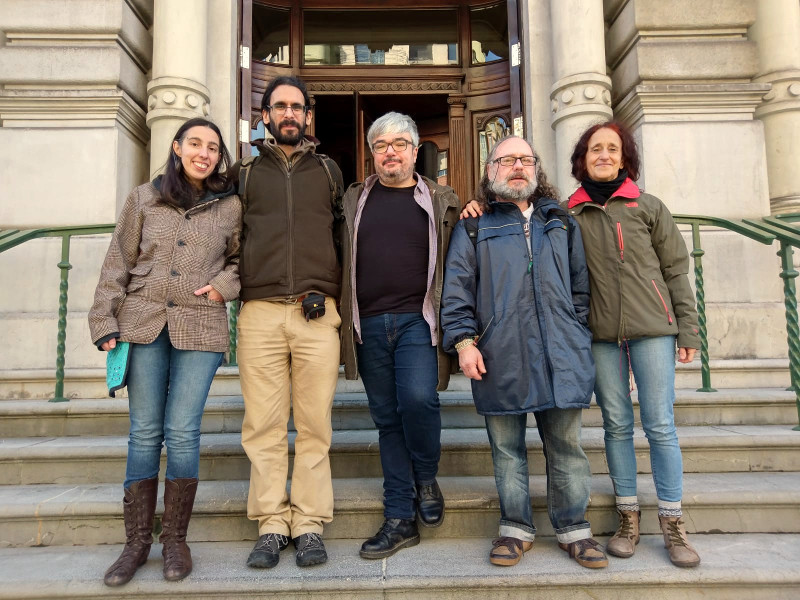 Pica Pica Hacklab team in front of the Parliament of Asturias after the Parliament's decision to support Public Money? Public Code!
Pica Pica Hacklab team in front of the Parliament of Asturias after the Parliament's decision to support Public Money? Public Code!
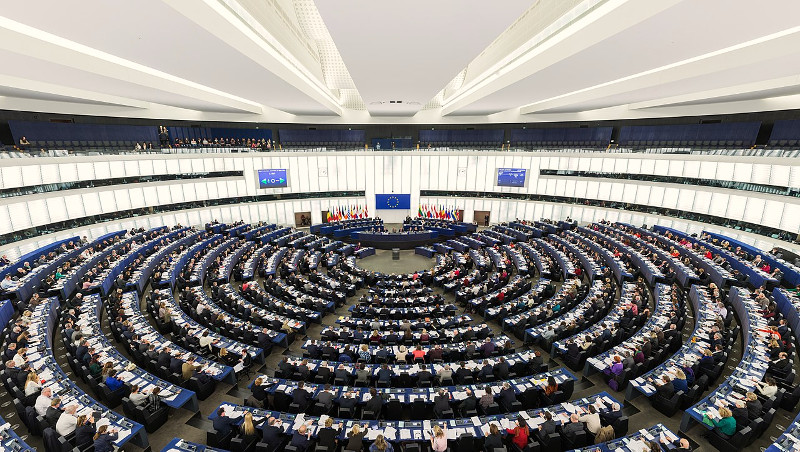 The European Parliament during a plenary session in Strasbourg. (
The European Parliament during a plenary session in Strasbourg. (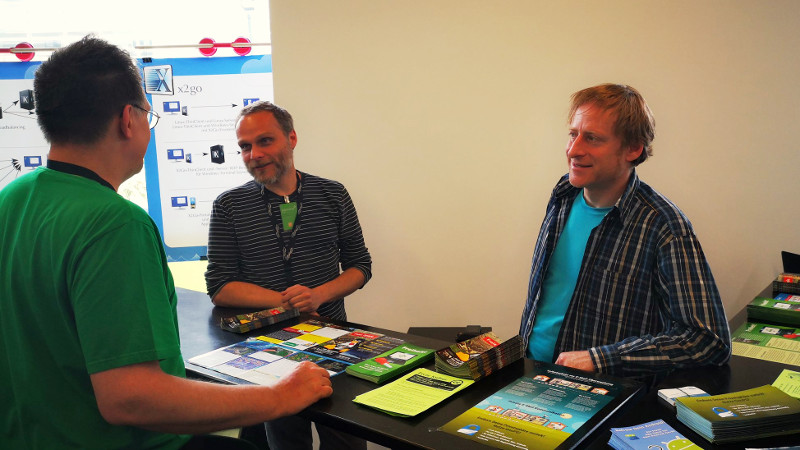 FSFE booth at Linuxwochen Wien
Carmen Bianca Bakker writes
FSFE booth at Linuxwochen Wien
Carmen Bianca Bakker writes 